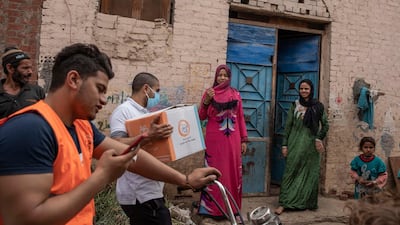Egyptian police on Saturday clashed with villagers north of Cairo who blocked access to the local cemetery to prevent the burial of a 64-year-old woman who died of Covid-19, according to security officials.
Police arrested 20 villagers and the woman, a doctor, was buried, the officials said.
News of the clashes, in which police used tear gas and batons, followed the appearance on social media of images purporting to show residents of another village near Cairo sneaking out of a government-imposed quarantine following two deaths people from Covid-19 and the infection of dozens of others with the novel coronavirus that causes the disease. The authenticity of the images could not be independently verified, but the government’s media watchdog, the State Information Service, did not immediately challenge the images as it routinely does when fake ones surface.
A video clip of the clashes in the Nile Delta village north of Cairo purported to show dozens of villagers gathered, with rows of black-clad riot police facing them. Later in the video, the villagers are seen fleeing as the police charge them, firing tear gas.
Egypt’s mufti, or chief Islamic theologian, issued a statement saying that coronavirus victims are considered martyrs who deserved quick and decent burial in accordance with Islamic teachings. “It’s inappropriate to oppose the burial of coronavirus victims through mob actions that are alien to our religion, values and ethics,” said the mufti, Shawki Allam.
Saturday’s incident is at least the second where people have tried to stop burials of coronavirus victims in local cemeteries because of the false belief the virus would spread to them. But it was the first in which police used force.
Misinformation about the coronavirus persists despite a media campaign by authorities to explain how it is transmitted and how to avoid infection.
Egypt’s coronavirus outbreak has killed 135 people and infected 1,794 since the first case was confirmed in February, according to the latest figures released on Friday night. These are relatively low numbers given Egypt’s 100 million population and that they live on less than 10 per cent of the country’s land. Officials have said the daily increase in cases - 95 on Friday - was roughly within forecasts made a month ago. They however warned that ignoring measures introduced by authorities to limit the spread of the virus could have serious repercussions.
President Abdel Fattah El Sisi complained earlier this week that passengers in the minibuses that crisscross Cairo and other cities were not wearing face masks.
On Wednesday, a video clip showed the Egyptian leader during a surprise visit to a construction site in Cairo, shouting at supervisors for allowing crews to work without masks.
“Are my instructions ignored? There will be a big problem if I come back tomorrow and these people are still not wearing [masks],” the president says in the clip, whose authenticity was not contested by the presidential media office.
Mr El Sisi has ordered work to resume on the massive construction and infrastructure projects he has launched since taking office in 2014, arguing that he was not in favour of a complete lockdown to combat the coronavirus because it would hurt the millions who survive on daily wages.
Instead, the government has imposed a nighttime curfew, closed schools, universities and places of worship, banned large gatherings and halted international travel.


